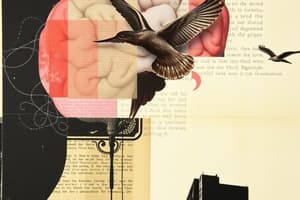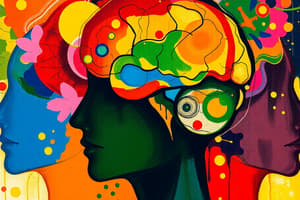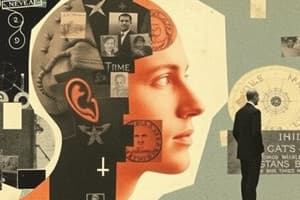Podcast
Questions and Answers
Which of the following best describes the focus of personality psychology?
Which of the following best describes the focus of personality psychology?
- Examining the biological processes that underlie cognitive functions.
- Investigating the historical development of psychological theories.
- Understanding the consistent patterns of thoughts, behaviors, and characteristics that make individuals unique. (correct)
- Analyzing sociological trends and their impact on group behavior.
Which of the following is NOT considered one of the Big Five personality dimensions?
Which of the following is NOT considered one of the Big Five personality dimensions?
- Introversion (correct)
- Conscientiousness
- Openness
- Agreeableness
What is the primary characteristic of extrinsic motivation?
What is the primary characteristic of extrinsic motivation?
- It is driven by a desire for personal growth and self-actualization.
- It stems from a deep-seated need to help others and contribute to society.
- It arises from an inherent interest or enjoyment in the activity itself.
- It is fueled by external rewards or pressures. (correct)
In Freud's structural model of the psyche, which component operates on the pleasure principle, seeking immediate gratification?
In Freud's structural model of the psyche, which component operates on the pleasure principle, seeking immediate gratification?
What does Emotional Intelligence (EQ) primarily determine?
What does Emotional Intelligence (EQ) primarily determine?
What is the focus of motivational psychology?
What is the focus of motivational psychology?
According to Charles Darwin's perspective on emotions, which statement is most accurate?
According to Charles Darwin's perspective on emotions, which statement is most accurate?
What is the key characteristic of 'emotional insulation' as a defense mechanism?
What is the key characteristic of 'emotional insulation' as a defense mechanism?
What is the most accurate definition of 'self-regulation'?
What is the most accurate definition of 'self-regulation'?
If a person is described as Choleric, Sanguine, Phlegmatic, or Melancholic, what is being characterized?
If a person is described as Choleric, Sanguine, Phlegmatic, or Melancholic, what is being characterized?
What is the definition of psychology?
What is the definition of psychology?
The word "psychology" comes from which language?
The word "psychology" comes from which language?
What field of study is considered the beginning of psychology?
What field of study is considered the beginning of psychology?
If something is a study of basic theories, principles, and methods, what is it probably describing?
If something is a study of basic theories, principles, and methods, what is it probably describing?
What field of psychology focuses on the influence of psychological factors related to physical activity?
What field of psychology focuses on the influence of psychological factors related to physical activity?
What type of psychologists address contemporary issues related to crime, terrorism, education, and healthcare?
What type of psychologists address contemporary issues related to crime, terrorism, education, and healthcare?
The psyche is commonly defined as the totality of what?
The psyche is commonly defined as the totality of what?
Which organ is most closely related to mental processes, according to psychology?
Which organ is most closely related to mental processes, according to psychology?
What type of process is motivation?
What type of process is motivation?
When did the psychology of health arise?
When did the psychology of health arise?
Flashcards
What is psychology?
What is psychology?
The study of the mind and behavior.
What is general psychology?
What is general psychology?
Basic theories, principles, and methods of psychology.
What is sports psychology?
What is sports psychology?
The study of how psychological factors influence sports, athletic performance, exercise, and physical activity.
Who is a psychologist?
Who is a psychologist?
Signup and view all the flashcards
What is the psyche?
What is the psyche?
Signup and view all the flashcards
What do mental processes include?
What do mental processes include?
Signup and view all the flashcards
What does personality psychology focus on?
What does personality psychology focus on?
Signup and view all the flashcards
Five personality factors:
Five personality factors:
Signup and view all the flashcards
Big five dimensions of personality?
Big five dimensions of personality?
Signup and view all the flashcards
What is extraversion?
What is extraversion?
Signup and view all the flashcards
Functions of the Ego?
Functions of the Ego?
Signup and view all the flashcards
What is Self-regulation?
What is Self-regulation?
Signup and view all the flashcards
Self-regulation: 4 aspects
Self-regulation: 4 aspects
Signup and view all the flashcards
Self-regulation methods?
Self-regulation methods?
Signup and view all the flashcards
What is motive (motivation)?
What is motive (motivation)?
Signup and view all the flashcards
What is self-motivation?
What is self-motivation?
Signup and view all the flashcards
What is intrinsic motivation?
What is intrinsic motivation?
Signup and view all the flashcards
What is extrinsic motivation?
What is extrinsic motivation?
Signup and view all the flashcards
What is emotion?
What is emotion?
Signup and view all the flashcards
What does EQ determine?
What does EQ determine?
Signup and view all the flashcards
Study Notes
Psychology Basics
- Psychology studies the mind and behavior.
- The term "psychology" originates from Greek.
- Philosophy marks the beginning of psychology.
- General psychology covers basic theories, principles, and methods.
Sports Psychology
- Sports psychology studies how psychological factors impact sports, exercise and performance.
Psychologists
- Psychologists are scientists, researchers, therapists, and clinicians.
- They address issues like relationships, public health, crime, education, economy, and healthcare via the study of human behavior.
Psyche
- The psyche is the entirety of the human mind, both conscious and unconscious.
- Mental processes encompass thoughts, feelings, and beliefs.
- The brain is the primary organ of focus in psychology.
Early Psychology
- The first psychological laboratory was opened in 1879.
Personality Psychology
- Personality psychology explores the development of personality, patterns of behavior, thoughts, and individual characteristics.
- Five factors shape personality: biological, social, cultural, physical, and situational.
- The Big Five personality dimensions: Openness, Conscientiousness, Extraversion, Agreeableness, and Neuroticism.
- Extraversion includes excitability, sociability, talkativeness, assertiveness, and emotional expressiveness.
The Ego
- The ego mediates between the id's desires and societal norms.
Temperament and Self-Regulation
- Temperament is a set of genetically determined psychic qualities.
- Basic temperaments are Choleric, Sanguine, Phlegmatic, and Melancholic.
- Self-regulation is the ability to manage energy states, emotions, thoughts, and behaviors.
- Self-regulation involves physical, emotional, mental, and social aspects.
- Methods for self-regulation: planning, monitoring, and reflection.
Motivation
- Motive is a need or desire which propels an individual in a direction.
- Motivational psychology studies biological, psychological, and environmental variables contributing to motivation.
- Self-motivation is driven by a sincere wish to achieve and intrinsic rewards.
- Motivation is an internal process.
- Intrinsic motivation for a behavior arises from within.
- Extrinsic motivation is driven by external rewards.
Emotion
- Emotion is a complex state of feeling resulting in physical and psychological changes that influence thoughts and behavior.
- Tips for improving emotional intelligence: listen, empathize, reflect.
- Five components of emotional intelligence: self-awareness, self-regulation, motivation, empathy, and social skills.
- Emotional psychology studies how emotions manifest.
Feelings
- Feelings are subjective, evaluative, and independent of evoking sensations, thoughts, or images.
- Feeling is a response to the emotion from the perception of a situation.
- Emotional insulation is a defense mechanism of indifference in response to frustrating events.
Aggression and Happiness
- Aggression aims to harm others physically or psychologically.
- Happiness is joy, gladness, satisfaction, and well-being.
Emotion Regulation
- Emotion regulation is the ability to modulate emotions.
Health Psychology
- Health psychology examines how biology, psychology, behavior, and social factors affect health and illness.
- Health psychology emerged in 1970.
- Goals include understanding factors for health/illness, preventing illness, and finding treatments for pain.
- Psychosomatic describes the psychological component of somatic disturbances.
- A psychosomatic disorder involves both mind and body.
Basic Emotions
- Paul Ekman identified happiness, sadness, fear, disgust, anger, and surprise in 1972.
- The 'Broaden-and-Build Theory' suggests positive emotions broaden awareness and encourage exploratory actions.
Darwin and Emotion
- Darwin’s views: emotional expressions are universal, biologically inherited, and evolved for survival.
- Frowning and furrowed brows are facial expressions associated with anger.
- Keith Beasley first used the term EQ.
- The Cannon-Bard theory states that physiological arousal and emotional experience occur simultaneously and independently.
- Feelings are the result of emotions.
- A microexpression is a brief, involuntary facial expression revealing true emotion.
- Three components of emotion: subjective experience, physiological response, and behavioral or expressive response.
Emotional Intelligence
- EQ determines how individuals interact, treat people, and cope with pressures.
- Emotions can influence decision-making, and negative emotions can increase caution.
- Darwin's initial focus in facial recognition studies was emotion.
- The primary function of basic emotions is to communicate
- Fear is associated with the fight-or-flight response
- Darwin suggested emotions help individuals respond adaptively, are shared across species, and have evolutionary significance.
- Emotional development is a gradual increase in experiencing, expressing, and interpreting emotions.
Emotional Cognition
- Emotional cognition is the ability to recognize and interpret others' emotions.
- Fear is the universal basic emotion according to Ekman.
- Emotions are behavioral, cognitive, and physiological patterns in response to stimuli.
- Happiness is the universal facial expression of emotion according to Ekman.
- Emotional intelligence is the term for identifying, assessing, and controlling emotions.
- Darwin's approach emphasizes that emotions are biologically inherited and have evolutionary continuity.
- Darwin studied emotions by observing facial expressions and analyzing photographs.
Social Psychology and Carl Jung
- Social psychology focuses on group behavior, social influences, attitudes, and related topics.
- Emotional stability is exhibited by calm, emotionally stable individuals.
- Carl Jung's psychoanalysis is called analytic psychology.
Developmental Psychology
- Developmental psychology studies changes in physical, cognitive, and socioemotional processes throughout life.
- Neuroticism is exhibited by impulsive, emotionally unstable people.
- Openness is exhibited by imaginative, curious, and open individuals.
- Freud structured the mind into conscious and unconscious parts.
- Motivation types are external and internal.
The Id
- The id seeks immediate gratification.
Self-Motivation
- Self-motivation is the best kind of motivation.
Biological Psychology
- Biological psychology studies the biological underpinnings of behavior and mental states.
- Personality is defined as characteristic patterns of thoughts, feelings, and behaviors that make a person unique.
- Extrinsic motivation is driven by external rewards.
- Openness is exhibited by logical and analytical individuals.
- Motivation is an individual's intensity, direction, and persistence for achieving a goal.
- Abraham Maslow explained motivation through a hierarchy of needs.
- The id operates unconsciously on instinctual drives.
- Basic biological needs are considered intrinsic motivation.
- Sigmund Freud proposed the unconscious mind and psychoanalysis theory.
- Intrinsic motivators are related to personal enjoyment and satisfaction.
Studying That Suits You
Use AI to generate personalized quizzes and flashcards to suit your learning preferences.




